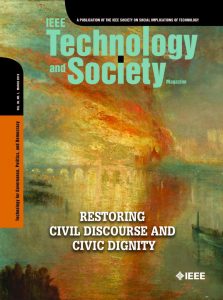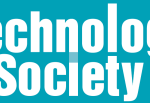
THE BURNING OF THE HOUSES OF PARLIAMENT. J.M.W. TURNER, 1835. /WIKIMEDIA.
March 2019
Technology for Governance, Politics, and Democracy
Innovative Information and Communication Technologies (ICT) already play an important role in e-governance and digital democracy, both at national and community levels. There is unprecedented opportunity for community collective choice, whereby citizens who are affected by a set of governing rules can help to select policy options, rank spending priorities, and can, in partnership with their local government representatives, participate in the approval, implementation, modification, and application of those rules. Parliaments can be petitioned by citizen groups to insert debates into the legislative process. Social networking ICTs make it possible for politicians and political parties to engage directly with citizens at every stage of the democratic process. But not all their effects are positive.
—Tom Kane and Nick Novelli, Guest Editors, from Special Issue Introduction
Free Online Content
 BOOK REVIEW: Algorithms of Oppression Posted in: Artificial Intelligence (AI), Book Reviews, Human Impacts, Magazine Articles, Social Implications of Technology, Societal Impact - Discrimination is “embedded in computer code and, increasingly, in artificial intelligence technologies that we are reliant on, by choice or… ... Read More
BOOK REVIEW: Algorithms of Oppression Posted in: Artificial Intelligence (AI), Book Reviews, Human Impacts, Magazine Articles, Social Implications of Technology, Societal Impact - Discrimination is “embedded in computer code and, increasingly, in artificial intelligence technologies that we are reliant on, by choice or… ... Read More Post Tenebras, Lux: An Awakening Posted in: Last Word, Magazine Articles, Social Implications of Technology, Societal Impact - Transition phases are often arduous and chaotic. When we read about positive outcomes, we can fail to recognize the formidable… ... Read More
Post Tenebras, Lux: An Awakening Posted in: Last Word, Magazine Articles, Social Implications of Technology, Societal Impact - Transition phases are often arduous and chaotic. When we read about positive outcomes, we can fail to recognize the formidable… ... Read More Smart Cities through Smart Regulation Posted in: Editorial & Opinion, Social Implications of Technology, Societal Impact - Smart Cities demand new strategies and forms of control. The traditional model of public regulation is challenged by a renewed… ... Read More
Smart Cities through Smart Regulation Posted in: Editorial & Opinion, Social Implications of Technology, Societal Impact - Smart Cities demand new strategies and forms of control. The traditional model of public regulation is challenged by a renewed… ... Read More Call for Papers — Special Issue of IEEE Technology and Society Magazine Posted in: Announcements, Social Implications of Technology, Societal Impact - The key question for the future is that with all the investment in new technologies, by both governments and business… ... Read More
Call for Papers — Special Issue of IEEE Technology and Society Magazine Posted in: Announcements, Social Implications of Technology, Societal Impact - The key question for the future is that with all the investment in new technologies, by both governments and business… ... Read More Efficiency Versus Creativity as Organizing Principles of Socio-Technical Systems Posted in: Commentary, Ethics, Human Impacts, Magazine Articles, Social Implications of Technology, Societal Impact - What sense of worth and dignity can a person have when their daily activities are confined within systemic contraptions where… ... Read More
Efficiency Versus Creativity as Organizing Principles of Socio-Technical Systems Posted in: Commentary, Ethics, Human Impacts, Magazine Articles, Social Implications of Technology, Societal Impact - What sense of worth and dignity can a person have when their daily activities are confined within systemic contraptions where… ... Read More The Democracy Lag Posted in: Editorial & Opinion, Magazine Articles, Social Implications of Technology, Societal Impact - U.K. democracy is out of date. It isn’t built to deal with digital tools that have unprecedented potential to manipulate… ... Read More
The Democracy Lag Posted in: Editorial & Opinion, Magazine Articles, Social Implications of Technology, Societal Impact - U.K. democracy is out of date. It isn’t built to deal with digital tools that have unprecedented potential to manipulate… ... Read More Past IEEE SSIT President Gerald L. Engel Dies at Age 76 Posted in: Magazine Articles, News and Notes, Social Implications of Technology - Gerald (Jerry) Engel, a past President of IEEE-SSIT, has died. ... Read More
Past IEEE SSIT President Gerald L. Engel Dies at Age 76 Posted in: Magazine Articles, News and Notes, Social Implications of Technology - Gerald (Jerry) Engel, a past President of IEEE-SSIT, has died. ... Read More Technology for Governance, Politics, and Democracy Posted in: Editorial & Opinion, Ethics, Human Impacts, Magazine Articles, Social Implications of Technology, Societal Impact - Innovative Information and Communication Technologies play an important role in e-governance and digital democracy. There is unprecedented opportunity for community… ... Read More
Technology for Governance, Politics, and Democracy Posted in: Editorial & Opinion, Ethics, Human Impacts, Magazine Articles, Social Implications of Technology, Societal Impact - Innovative Information and Communication Technologies play an important role in e-governance and digital democracy. There is unprecedented opportunity for community… ... Read More President’s Message – Congratulations and Thanks Posted in: Magazine Articles, President's Message, Social Implications of Technology - As new SSIT President, I congratulate the three people who were elected to the Member-at-Large positions on the SSIT Board… ... Read More
President’s Message – Congratulations and Thanks Posted in: Magazine Articles, President's Message, Social Implications of Technology - As new SSIT President, I congratulate the three people who were elected to the Member-at-Large positions on the SSIT Board… ... Read More Facts, Policies, and Values– The Democratic Triad Posted in: Editorial & Opinion, Ethics, Magazine Articles, Social Implications of Technology, Societal Impact - Politics required dialogue, deliberation, negotiation, and compromise. But now there is a dispute over the facts themselves. ... Read More
Facts, Policies, and Values– The Democratic Triad Posted in: Editorial & Opinion, Ethics, Magazine Articles, Social Implications of Technology, Societal Impact - Politics required dialogue, deliberation, negotiation, and compromise. But now there is a dispute over the facts themselves. ... Read More
Departments
Efficiency versus Creativity as Organizing Principles of Socio-Technical Systems: Why Do We Build (Intelligent) Systems?*
Ada Diaconescu
The Democracy Lag: Updating Electoral Law and the Need for a Digital Bill of Rights
Caroline Lucas
Smart Cities through Smart Regulation: The Case of São Paulo
Gustavo Gil Gasiola, Juliano Marçal Lopes, Augusto Ferreira Brandão Júnior, and Eduardo Mario Dias
Technology for Governance, Politics, and Democracy
Tom Kane and Nick Novelli
Features
Brook Manville and Josiah Ober
Jeremy Pitt, Agnieszka Rychwalska, Magdalena Roszczyn´ska-Kurasin´ska, and Andrzej Nowak
Leandro De Brasi
Satish M. Srinivasan, Raghvinder S. Sangwan, Colin J. Neill, and Tianhai Zu
Jaigris Hodson
NOTE: Most IEEE Technology and Society Magazine columns and department articles are publicly accessible at no charge. Click on the title of any non-refereed article to read.
SSIT membership (subscription) is required to access refereed articles (marked with asterisk).






 JOIN SSIT
JOIN SSIT